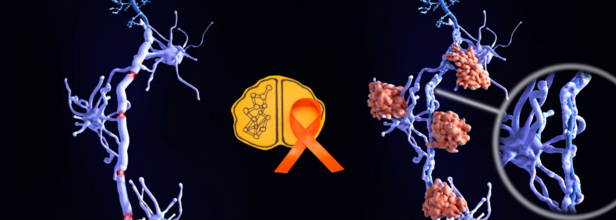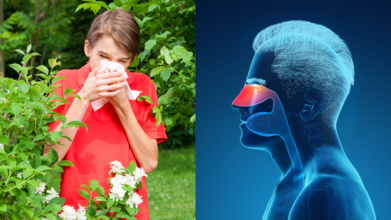- Health Conditions A-Z
- Health & Wellness
- Nutrition
- Fitness
- Health News
- Ayurveda
- Videos
- Medicine A-Z
- Parenting
- Web Stories
Why Lip Scrubs Aren’t The Best Solution To Winter Dryness

Image Credit: Canva
Winter's chill can have destructive effects on your skin, and your lips are one of the first things that may bear the brunt during this season. While many may experience chapped and dry skin, others will reach the more severe conditions of split lip and cold sores resulting from the frosty weather, biting wind, or the lack of humidity, rendering your pout into becoming a problem. But fear not—this guide will walk you through everything you need to know about protecting, soothing, and rejuvenating your lips during winter.
Why Do Lips Suffer More in Winter?
The skin on your lips is thin and sensitive compared to the rest of the skin on your body. In contrast with other body parts, there are no oil glands for the lips; this means the lips can dry out rather quickly and are especially prone to dryness by wind and cold air. Dry winter air, inside or outside the house, tends to make chapping even worse.
Even habits like licking your lips can compound the problem. While saliva might feel like a temporary solution, it dries up very quickly, leaving lips drier than before. If left untreated, these issues can lead to painful conditions like split, bleeding lips or even trigger cold sores.
Risks of Lip Scrubs
It’s tempting to grab a lip scrub when dry flakes appear, but dermatologists caution against it. Scrubbing can disrupt your lips’ natural barrier, leaving them vulnerable to bacteria, further dryness, and irritation. Moreover, many lip scrubs contain harsh ingredients such as peppermint oil or fragrances, which can cause contact dermatitis, leading to redness, itching, and even swelling.
And for a healthier substitute, dermatologists suggest focusing more on hydration and nourishment rather than exfoliation. Lip balms with gentle, moisturizing ingredients can sometimes be the best without compromising integrity.
Smart Tips for Winter Lip Care
1. Hydrate Inside and Out
Keep your lips hydrated by starting from the inside. Ensure your hydration levels are in place. Drink enough water every day to keep your insides moist. For the external, apply hydrating lip balm often during the day and before sleeping at night.
2. Select the Lip Balms Wisely
Look for fragrance-free, hypoallergenic lip balms that are packed with nourishing ingredients like shea butter, ceramides, and glycerin. Avoid balms containing camphor, menthol, or fragrances, as these can cause irritation.
3. Protect with SPF
Just because it's winter doesn't mean UV rays take a break. Use a lip balm with SPF 30 or higher to protect your lips from sun damage.
4. Use a Humidifier
Indoor heating systems can dry out the environment, making it even trickier to keep your mouth moist. A humidifier can help create a more humane environment at home.
5. Avoid Picking and Licking
Resist the urge to pick at dry flakes or lick your lips. Picking can lead to further irritation or even infections, while licking creates a cycle of dryness as saliva evaporates. Instead, reapply lip balm whenever the temptation strikes.
Editor’s Picks: Winter Lip Care Essentials
We have curated a list of tried-and-true products to help you combat winter's harsh effects on your lips. Each product was carefully evaluated for its ingredients, efficacy, and ability to provide long-lasting hydration:
- Rhode Peptide Lip Treatment: Packed with peptides and nourishing oils, this treatment works wonders on repairing cracked lips.
- Hyphen Peptide Lip Balm-This balm combines peptides with plant-based ingredients to provide deep hydration and soft, supple finish.
- Flurth AM-PM Lip Kit-This is suitable for round-the-clock care, as it contains both a day balm that offers SPF and a night balm that deeply hydrates.
How We Tested: Our choice was based on personal feedback, ingredient analysis, and dermatologist recommendations. Each product was put to four weeks of usage to test whether it could stand up to the season's drying effects. These are the products that delivered hydration and protection; hence, they are winter must-haves.
Should You Seek Professional Help?
While most cases of dry, chapped lips can be controlled with proper care, certain symptoms may require the help of a dermatologist. For instance, if your lips become constantly cracked, inflamed, or develop blisters, it may be an underlying condition such as eczema or a severe allergic reaction. Do not wait until over-the-counter treatments don't work for you; consult a healthcare professional immediately.
Winter lip care is mostly about prevention and protection. High-quality products, good habits, and hydration keep dry, chapped lips away, and the discomfort disappears. Lips are part of your outer self and well-being. Take good care of your lips so that they always feel smooth and ready for winter kissing.
New Oral Treatment Offers Hope For MS Patients Battling Muscle Spasticity

Credits: Canva
For many individuals living with multiple sclerosis (MS), muscle spasticity, an often painful and limiting symptom, can be one of the most persistent and frustrating aspects of the disease. Characterized by stiff or tight muscles that resist movement, spasticity can interfere with basic activities like walking, dressing, or even sleeping. But an encouraging breakthrough may be on the horizon.
Researchers at the University of Cincinnati’s Gardner Neuroscience Institute are currently conducting a promising Phase 2 clinical trial for a new oral drug that targets the body’s endocannabinoid system, a natural internal mechanism that helps regulate muscle tone and relaxation. Rather than introducing an external muscle relaxant, this treatment is designed to enhance the body’s own ability to ease muscle stiffness by preventing the breakdown of naturally occurring compounds called endocannabinoids.
“Our goal is to find a treatment that’s not only effective, but also better tolerated during the day,” said Dr. Shahla Hosseini, MD, PhD, in a statement released by the university. “Most existing oral medications come with side effects like drowsiness or fatigue, which can significantly reduce a patient’s quality of life.”
How the New Drug Works
The new treatment under investigation inhibits specific enzymes that normally break down endocannabinoids in the body. These endocannabinoids function like the body’s natural muscle relaxers, but in people with MS, their levels tend to be low. By elevating endocannabinoid levels, the drug aims to restore better muscle control without the sedation that plagues current treatments.
This trial will involve approximately 200 participants from multiple international sites, making it a robust, multicenter effort. Over a period of six weeks, participants will be randomly assigned to receive one of three different doses of the study drug or a placebo. There’s also an optional six-week extension, which allows all participants to potentially receive the active drug and helps researchers compare the varying doses more effectively.
If successful, the trial could pave the way for a new class of medications to be used in tandem with current therapies like physiotherapy and botulinum toxin (Botox) injections. The drug’s oral format also means it could offer a non-invasive, easier-to-manage option for long-term symptom relief.
Broader Potential Beyond MS
While this trial is focused on MS-related spasticity, researchers are hopeful that the drug could eventually help individuals with other neurological disorders that impact muscle control, including spinal cord injuries, cerebral palsy, and stroke. This makes the study’s success particularly significant, not just for those with MS, but for a wider community of patients affected by similar conditions.
What is Multiple Sclerosis (MS)?
Multiple sclerosis (MS) is a chronic autoimmune disease that affects the central nervous system—including the brain and spinal cord. In MS, the immune system mistakenly attacks the protective sheath (myelin) that covers nerve fibers, disrupting the communication between the brain and the rest of the body. Over time, this can lead to nerve damage and deterioration.
Common Symptoms of MS:
- Muscle spasticity or stiffness
- Fatigue
- Difficulty walking or maintaining balance
- Vision problems (e.g., blurred or double vision)
- Numbness or tingling, especially in the limbs
- Cognitive difficulties
- Bladder and bowel dysfunction
- Pain or muscle cramps
Symptoms can vary widely depending on the area of the nervous system affected, and they often come and go in episodes known as relapses.
How is MS Diagnosed?
Diagnosing MS can be complex and typically involves a combination of:
- Neurological exams to assess reflexes, vision, coordination, and balance
- MRI scans to detect lesions or areas of demyelination in the brain or spinal cord
- Lumbar puncture (spinal tap) to examine cerebrospinal fluid for specific immune markers
- Evoked potential tests to measure electrical activity in response to stimuli
There’s no single test for MS, so diagnosis often involves ruling out other conditions with similar symptoms.
Think It Is Just a Cold? It Could Be Allergic Rhinitis, and Here is Why Early Testing and Treatment Matter

When the sniffles will not stop and your mornings start with continuous sneezing, it is natural to assume you have caught a cold. But what if it is something more persistent, like allergic rhinitis?
What is allergic rhinitis?
Allergic rhinitis is an allergic reaction that occurs when your immune system overreacts to allergens like pollen, dust mites, animal dander, or mould. This common condition is marked by a suite of symptoms, including sneezing spells, a runny or blocked nose, itchy, watery eyes, post-nasal drip, fatigue, poor sleep, and constant coughing. Unlike the common cold, it is not caused by a virus, and symptoms can persist for weeks or months or even all year round.
How is it diagnosed?
Dr. Manish Arya of the ENT, Allergy and Vertigo Clinic points out that “most people with allergies are unaware of the exact trigger causing their symptoms. That is where the skin prick test (SPT) comes in.”
This quick, safe diagnostic tool involves pricking tiny amounts of various allergens into the skin—typically on the forearm or back. “If you are allergic to a substance, a small red bump (like a mosquito bite) appears in 15–20 minutes,” he explains.
The benefits of the SPT are many:
- It helps identify specific allergens such as dust mites, pollens, fungi, pets, or certain foods.
- It guides both avoidance strategies and treatment plans.
- It is painless – just small skin pricks!
What is allergy immunotherapy?
While most people turn to antihistamines or nasal sprays, Dr. Arya says that these only provide temporary relief. “That is where immunotherapy comes into play; it is like a vaccine for your allergy,” he says. Immunotherapy aims to gradually desensitise the immune system to allergens and is the only known method to reduce allergies in the long term.
According to Dr Arya, it can be administered through:
- Allergy shots (Subcutaneous Immunotherapy or SCIT)
- Under-the-tongue drops/tablets (Sublingual Immunotherapy or SLIT)
What does immunotherapy offer?
- Reduces symptom severity over time.
- Decreases dependency on medicines.
- Prevents worsening of allergies or the development of asthma.
- Safe for children and adults.
Dr. Arya emphasises, “It is a long-term investment in your health, usually taken over 3 years. In some cases, it may be extended up to 5 years. It does not contain any steroids or antihistamines and is completely natural.”
Why Early Testing and Treatment Matter
“Allergic rhinitis is not just a nuisance,” warns Dr. Arya. If left untreated, it can:
- Over a period of time, it may worsen to asthma as well in about 50 per cent of cases.
- Cause recurrent sinus infections.
- Affect sleep and work/school performance.
- Lead to ear problems in children.
“Allergies can take a toll on your quality of life,” Dr. Arya says. So instead of just popping pills every season, it is time to find out what you are allergic to and treat the root cause. Skin prick testing and immunotherapy have transformed how we manage allergic rhinitis today.”
Quick Allergy Checklist – Do You Have It?
- Frequent sneezing, especially in the mornings
- Nasal congestion or watery discharge
- Itchy eyes or throat
- Symptoms triggered by dust, pollen, or pets – or sometimes without any trigger!
- No fever (unlike colds)
Developing These Health Conditions Before 55 Can Double The Risk Of Dementia

(Credit-Canva)
Dementia is a condition that can effectively dismantle a person’s life and everything they have worked for. Your memories, the way you think and behave, and all of these factors will slowly change as dementia progresses. While we have known about the disease for quite some time now, there are many aspects of it that we are still exploring, like what are some of its risk factors and causes, as these will help us find a cure for the disease.
New research suggests that developing conditions like heart disease and diabetes before age 55 could significantly raise your chances of developing dementia later in life. The study also indicates that experiencing strokes or mental health issues such as anxiety and depression between ages 55 and 70 might double that risk.
Key Conditions and Critical Time Windows
The study, published in Brain Communications, revealed that heart conditions, including heart disease and an irregular heartbeat called atrial fibrillation, along with diabetes, were most strongly linked to an increased risk of dementia when they appeared before age 55. However, for those between 55 and 70, mental health disorders like anxiety and depression, as well as strokes, were found to double the dementia risk. This suggests different conditions pose a higher risk at different stages of life.
Link Between Chronic Conditions and Dementia
Researchers at the University of Oxford found that a large majority, about 80%, of people with dementia also have two or more chronic health problems. However, there hasn't been a clear understanding of how specific diseases, and when they occur, are connected to dementia. This study aimed to identify important periods in life where certain illnesses pose the biggest threat. They analysed health information from over 282,000 individuals in the UK Biobank, looking at patterns across 46 long-term health conditions.
Other Risk Factors for Dementia
According to Stanford Health Care, many things can raise a person's chance of getting dementia, though some factors we can change and others we can't. Growing older significantly increases the risk for common types like Alzheimer's and vascular dementia. Your genes and family history also play a role, as certain genes can increase the risk for Alzheimer's and other rarer forms like Creutzfeldt-Jakob disease.
However, having a family member with Alzheimer's doesn't guarantee you'll get it, and many without a family history still develop it. People with Down's syndrome often show signs of Alzheimer's in middle age.
Lifestyle choices matter too. For example, smoking heavily increases dementia risk, possibly due to its link with hardened arteries. While heavy alcohol use seems to increase risk, moderate drinking might actually lower it compared to drinking a lot or not at all. Health conditions are also key factors. Atherosclerosis, where arteries harden, is a big risk for vascular dementia and might be linked to Alzheimer's.
High "bad" cholesterol (LDL), high levels of an amino acid called homocysteine, and diabetes all raise the risk for both Alzheimer's and vascular dementia. Finally, if someone has mild cognitive impairment, they are at a much higher risk of developing dementia, with about 40% of those over 65 progressing to dementia within three years in one study.
Insights for Future Prevention
This research highlighted that individuals who had conditions like heart disease and diabetes in middle age and then later developed strokes and mental health disorders faced the highest chance of getting dementia. Experts em that considering all existing health issues is important when assessing someone's dementia risk, which could help in creating strategies to lower that risk at particular life stages. Future studies will explore if managing or preventing these health problems during these critical periods could reduce dementia rates.
© 2024 Bennett, Coleman & Company Limited

